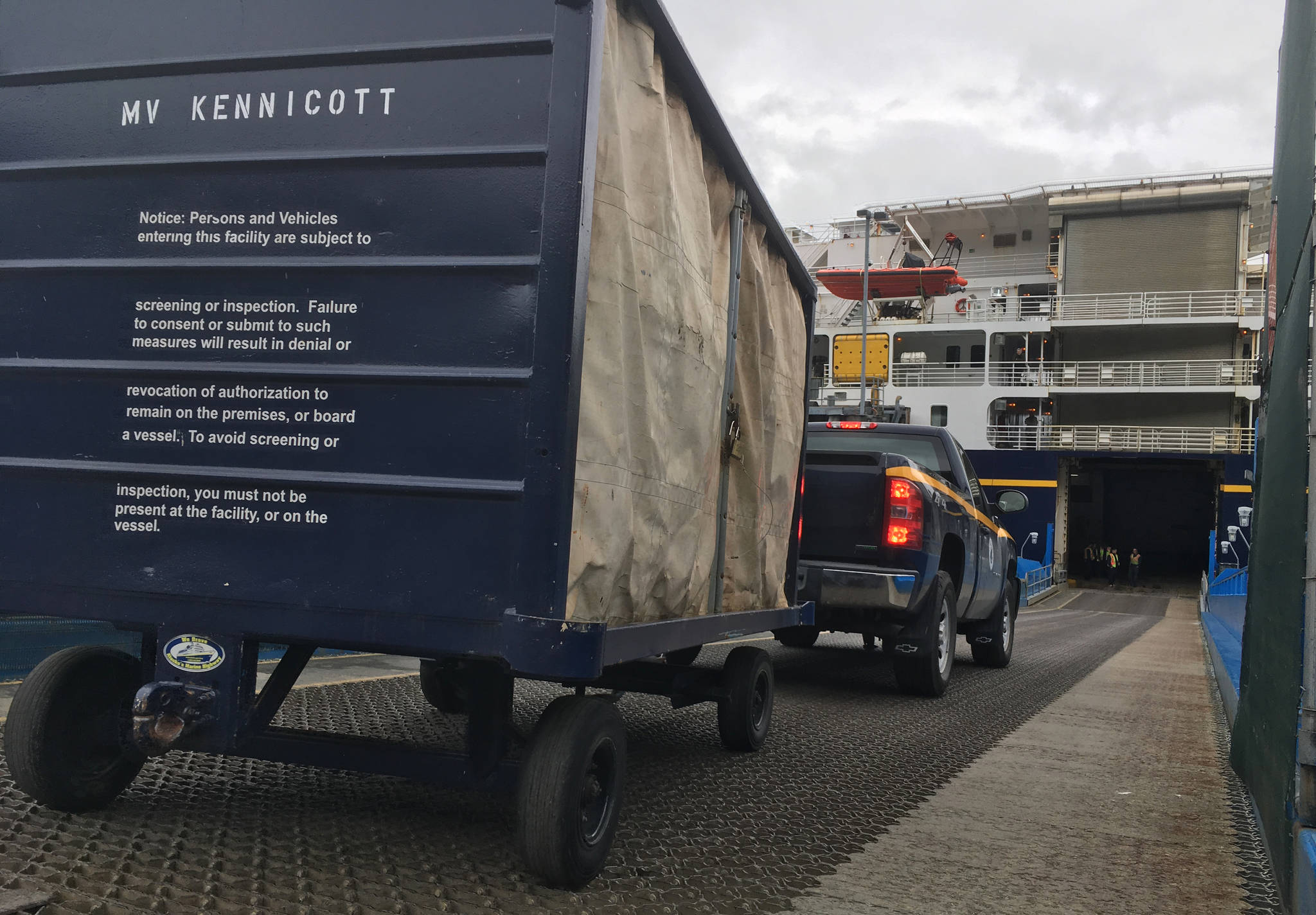If Alaska’s state government shuts down on July 1, the Alaska Marine Highway System will shut down with it, and Nevette Bowen will have to find a new way to get to work.
For the past 25 years, she has split time between fishing in Petersburg and fishing in Yakutat. On a cold and gray Tuesday morning, she sat in her truck, waiting to board the ferry Kennicott from Juneau to Yakutat and another round of fish.
“I don’t want to miss this! I’ve been here since 6 this morning,” she said.
If the ferry system shuts down, she’ll be in the same boat as many Southeast Alaskans: They’ll all be looking for one.
To date, Alaska Department of Transportation commissioner Marc Luiken has not provided exact details of what will happen on July 1.
“Hopefully, we can keep them running at least to a logical port where it at least makes sense for them to go, and ideally, we won’t miss a beat,” he said by phone last week.
In line at Juneau’s Auke Bay ferry terminal, those waiting to sail to Yakutat were pondering what happens when the beat drops.
“Just moving vehicles and boats around is really important to us,” Bowen said. “I’d struggle by with my finances, and you’d have to use the barge, but it only comes once a month.”
In the next aisle of traffic, Ron Ekis waited to board the Kennicott with a truckload of construction material.
“We’d have to fly, absolutely,” if the ferry system shuts down, he said.
“We can make it work, but it’s more convenient with a ferry run,” he added.
With a nod toward events happening in the Capitol — or not happening, as the case might be this year — he said the state’s budget situation isn’t “rocket science. Quit spending so much money on stupid things. Get it done in the time you’re allotted.”
This year, that’s been easier said than done. Despite six months of work, lawmakers haven’t agreed upon a state budget, let alone a way to pay for it.
Friday is the final day of a special session called by Gov. Bill Walker in an attempt to force lawmakers to agree. If they can’t reach a solution, Walker will be forced to call a special session to give the Legislature a final two weeks to draft a budget.
If lawmakers still can’t get it done, the government will shut down starting July 1.
In 2015, the state was in a similar, though less dire situation. On June 1 that year, the ferry sent a warning to all booked passengers.
“AMHS apologizes to our loyal customers and the traveling public for the turmoil, confusion and potentially extensive disruption this action will cause,” the warning message stated.
Liz Perry, executive director of Travel Juneau, remembers what happened after that.
“People were calling in and saying gee, the ferry system is getting ready to shut down, what do I do?” she said by phone. “We would have to guide them as best we could.”
Hotels and other Juneau businesses reported cancellations as ferry-booked tourists aborted their plans in expectation of a shutdown.
This year, the ferry system has changed its strategy. With lawmakers even farther from a budget deal and a shutdown even closer, AMHS has sent no warning to passengers.
“We don’t want people to panic ahead of time, but if in fact we don’t have a budget on the 30th of June … then we’re probably going to have to start making some phone calls,” commissioner Luiken said.
Even a brief shutdown would be harmful to Juneau, Perry said.
“It impacts hotel reservations, it impacts restaurants … the ripple effect is going to be widespread,” she said.
Robert Venables, chairman of Alaska’s Marine Transportation Advisory Board and a ferry system expert for Southeast Conference, said a shutdown is “one of those things where uncertainty is very destabilizing.”
Even if a shutdown lasts only a few days, passengers — locals and tourists alike — will be encouraged to make other plans. That would encourage a downward trend in ferry travel that’s already been happening for several years.
July is the busiest month for the marine highway, historical statistics show. A study of AMHS traffic in 2015 found 45,965 passengers aboard Alaska’s ferries in July, about 16 percent of the fleet’s traffic for the entire year.
“The tourism industry by and large, is not embracing it like they used to; the fishing industry is not utilizing the system like it used to,” Venables said.
A shutdown, while not immediately fatal to the ferry system, could inflict a mortal wound, and that would critically harm remote communities.
“Just like digging up the Parks Highway, there’s no alternative,” Venables said. “I hope that folks are plugged in because this is just one portion of a much more meaningful picture that has been well-publicized.”
At the Auke Bay ferry terminal, Peter and Nora Ribbens of Nikiski were among the last passengers to board before the Kennicott took advantage of tide and current to leave at noon.
Peter said he’s one of those “troglodytes” who supports an income tax to balance the state budget and backs keeping the ferry system going.
Even then, he believes Alaskans will make do, even if the ferry system is forced to close for a while.
“I think it would be shortsighted to say that without the ferry system the world would come to a crashing halt,” he said. “People would figure something out. (The state) worked for a long time without it, but it would be a loss, no doubt about it.”
• Contact reporter James Brooks at james.k.brooks@juneauempire.com or call 419-7732.

